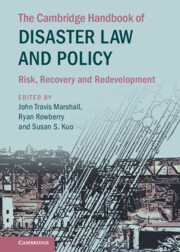Book contents
- The Cambridge Handbook of Disaster Law and Policy
- The Cambridge Handbook of Disaster Law and Policy
- Copyright page
- Dedication
- Contents
- Figures
- Maps
- Tables
- Contributors
- Foreword: Current Trends in Disaster Law and Policy
- Acknowledgments
- Introduction
- Part I Critical Perspectives on the Evolution of Disaster Law and Policy
- Part II Effective Governance as an Imperative for Responsive Disaster Law and Policy
- Part III Law’s Role in Promoting Hazard Mitigation: Intergovernmental, International, National, and Local Approaches
- Part IV Private Sector Initiatives to Promote Disaster Resilience and Recovery
- Part V Lawyers As Disaster Law and Policy Leaders: Training for Students and Guidance for Practitioners
- 24 Creating Blueprints for Law School Responses to Natural Disasters
- 25 Law and Lawyers in Disaster Response
- Part VI Cultural Heritage Protection and Cross-Disciplinary Opportunities for Advancing Disaster Law and Policy
- Part VII Disasters and Vulnerable Communities
25 - Law and Lawyers in Disaster Response
from Part V - Lawyers As Disaster Law and Policy Leaders: Training for Students and Guidance for Practitioners
Published online by Cambridge University Press: 27 October 2022
- The Cambridge Handbook of Disaster Law and Policy
- The Cambridge Handbook of Disaster Law and Policy
- Copyright page
- Dedication
- Contents
- Figures
- Maps
- Tables
- Contributors
- Foreword: Current Trends in Disaster Law and Policy
- Acknowledgments
- Introduction
- Part I Critical Perspectives on the Evolution of Disaster Law and Policy
- Part II Effective Governance as an Imperative for Responsive Disaster Law and Policy
- Part III Law’s Role in Promoting Hazard Mitigation: Intergovernmental, International, National, and Local Approaches
- Part IV Private Sector Initiatives to Promote Disaster Resilience and Recovery
- Part V Lawyers As Disaster Law and Policy Leaders: Training for Students and Guidance for Practitioners
- 24 Creating Blueprints for Law School Responses to Natural Disasters
- 25 Law and Lawyers in Disaster Response
- Part VI Cultural Heritage Protection and Cross-Disciplinary Opportunities for Advancing Disaster Law and Policy
- Part VII Disasters and Vulnerable Communities
Summary
Disasters in the United States require coordinated responses by many levels of government and necessitate many areas of technical assistance and expertise. Since at least Hurricane Katrina in 2005, it has become increasingly evident that effective disaster response requires legal assistance and expertise. This need for legal expertise became particularly prominent in the Covid-19 crisis of 2020, where federal, state, tribal, and other governments took extraordinary measures to contain the pandemic, raising questions about the legal authority and limits of such measures. To help prepare lawyers for engagement in future disasters, this chapter reviews basic tenets of disaster law, including governing statutes such as the federal Stafford Act and foundational theories such as the Disaster Cycle. The chapter also introduces useful materials, such as the National Response Framework, and key operational concepts, such as the Incident Command System.
Keywords
- Type
- Chapter
- Information
- The Cambridge Handbook of Disaster Law and PolicyRisk, Recovery, and Redevelopment, pp. 408 - 420Publisher: Cambridge University PressPrint publication year: 2022



